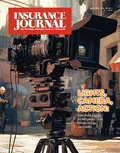While some insurance companies in Florida and beyond have balked at writing properties with rooftop solar panels, FM Global says it has pioneered an idea that may help – a testing system that certifies panels for fire and hail resistance.
“We did a ton of research on how panels are built and should be built,” said Louis Gritzo, chief science officer for FM, a mutual insurance company that focuses mostly on commercial properties around the world. “The hope is that it’s going to change the way that renewables are implemented and distributed.”
Gritzo, who spoke last week at the Insurance Innnovators USA in Nashville, hopes other carriers will utilize FM’s certification program, cover more solar-topped properties, and reduce their losses on structures that have the systems installed.

The biggest vulnerabilities for solar panels are fire and damage from hail storms, Gritzo noted. Walmart in 2019 famously sued Tesla Inc. after several rooftop fires broke out on stores in California, Maryland and Ohio, then reached a settlement. And some Florida-based carriers in recent years have shied away from covering residential and some commercial properties, contending that the panels, mounted on top of roof shingles, metal roof panels, or flat roofs, can lead to leaks and added expense when a roof needs to be repaired or replaced.
Researchers with the Florida Solar Energy Center, part of the University of Central Florida, have said that insurers’ concerns about solar systems are greatly overblown. The photovoltaic panels can help hold down shingles in high winds and have not been shown to cause leaks in the roof deck, in most cases, the center has found.
And fires are extremely rare, according to news reports. Hail damage is perhaps more common, but Gritzo, with a Ph.D. in mechanical engineering, believes the FM approval process now ensures that the glass panels are more impact-resistant. FM has developed standards for examination for panels, including the FM 4478 standard for severe hail, and separate standards for roof materials, known as FM 4473. A number of solar manufacturers now tout the certifications, and some insurers offer premium discounts for homes with the rated photovoltaic systems, according to Lumos, a manufacturer.
Solar panels are some of the dozens of products and systems that FM reviews for safety, durability and climate resilience. Although many carriers require for certain products, it’s rare for insurers themselves to invest in the testing and research.
It’s part of what has been called FM’s prevention-based approach to insurance, designed to reduce losses before a weather or other event occurs, according to Gritzo and company material. Much of the testing is done at FM’s 1,600-acre research campus near FM’s corporate headquarters in Rhode Island.
“Doing it this way really floats all boats,” Gritzo said about the solar system certification. “It would be great if other insurance companies want to use our certifications.”
Related: How to Protect Rooftop Solar Panels from Hail Damage
Topics Carriers Underwriting
Was this article valuable?
Here are more articles you may enjoy.



 After Years of Losses, Florida Insurers Saw Underwriting Profits in 2024, AM Best Says
After Years of Losses, Florida Insurers Saw Underwriting Profits in 2024, AM Best Says  More Tornadoes, Fewer Meteorologists Make for a Dangerous Mix
More Tornadoes, Fewer Meteorologists Make for a Dangerous Mix  ‘Big Beautiful’ Tax Breaks for Insurance Agents in Bill Passed by House, Says Big I
‘Big Beautiful’ Tax Breaks for Insurance Agents in Bill Passed by House, Says Big I  AIG Settles Lawsuit Against E&S Rival Dellwood and Former Employees
AIG Settles Lawsuit Against E&S Rival Dellwood and Former Employees 


